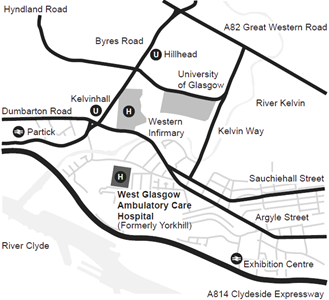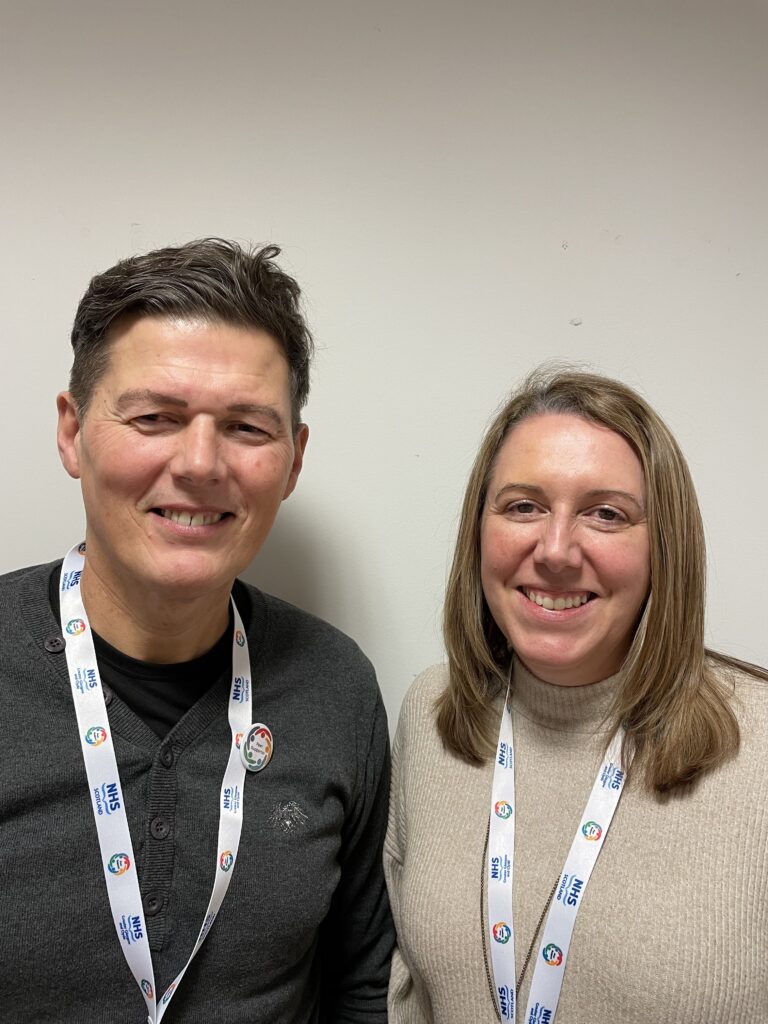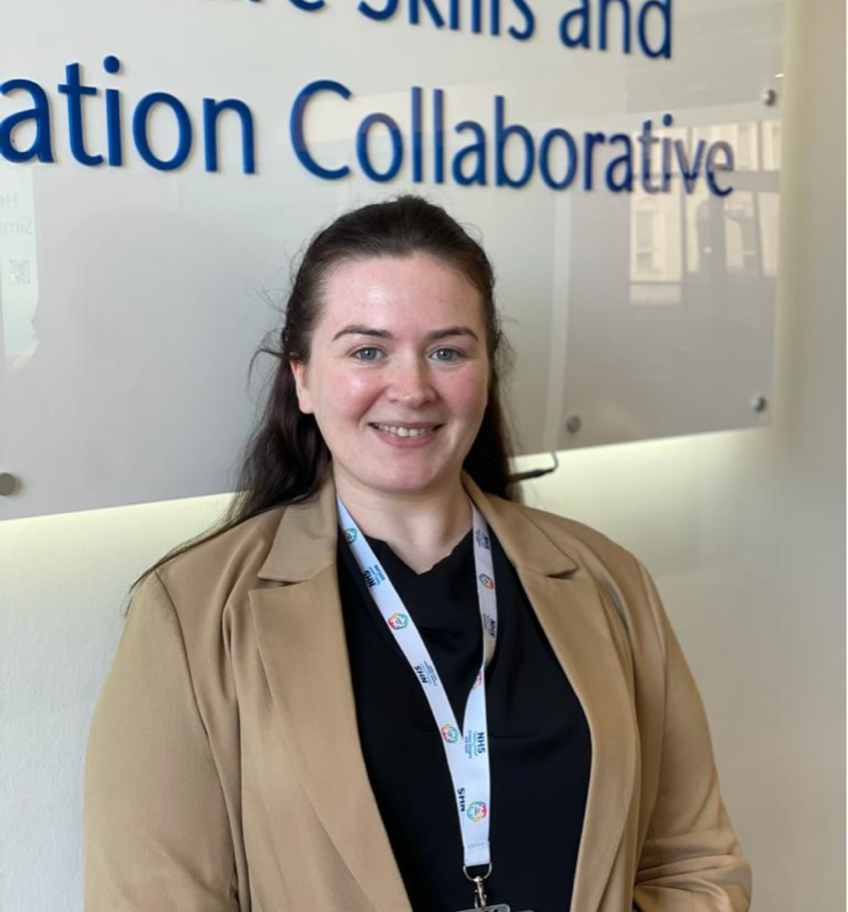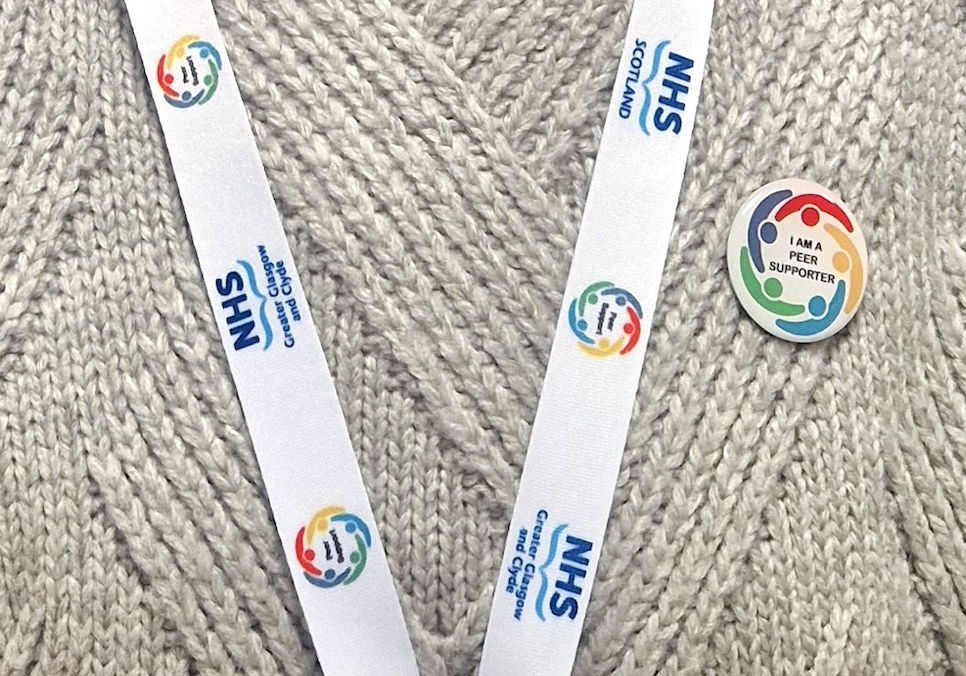This is available now and provides a full one-day in-person training session for colleagues to become a Peer Supporter. This has been designed by and is delivered by the NHSGGC Peer Support Service. Peer Supporters will have enough experience to meet the needs of their team/peers, and that the role is appropriate to their grading and level of seniority within a team.
It is essential that staff being considered for Peer Supporter roles are supported by their immediate line manager and the senior manager for their service to ensure they have allocated time to provide this support.
Become a Peer Supporter
Upcoming Peer Support training courses are promoted on Core Brief, StaffNet and email distribution lists. To join our email distribution list, contact peer.support@ggc.scot.nhs.uk to ensure you receive upcoming training opportunities.
Upcoming Peer Support (Level 2) Training Dates
Training dates are now available for colleagues who wish to explore the role and requirements of a Peer Supporter and have the support of their line manager to implement peer support in their local team. This course is one full day face-to-face (9:30am-4:30pm).
Delegates should note the following prerequisites for completion before the training day:
- Delegates to complete the online module ‘Looking after Yourself and Others’ (NHSGGC staff). The module is packed with essential hints and tips on how to look after your wellbeing and the wellbeing of others. It is available for staff directly employed by NHSGGC on Learnpro, module GCC 277 and for staff directly employed by the HSCPs social care staff, on their Local Authority learning platforms. or ‘Introduction to Psychological Wellbeing and Peer Support’ (Local Authority Staff)
- Delegates to discuss with their line manager aims for Peer Support and staff wellbeing in their team and / or service. Post course, delegates will be asked to agree with their line manager an action plan to implement local Peer Support and identify the time and resources to do this.
- It is important to consider your own wellbeing before thinking about supporting others. Please consider whether you are in the position to support your colleagues before you attend this training to become a Peer Supporter.
- 12/12/2024 – New Victoria ACH, Level 2, 16B, Book here
- 14/01/2025 – Stobhill ACH, Seminar Room 6, Book here
- 30/01/2025 – Gartnavel General Hospital, Lecture Theatre, Book here
- 12/02/2025 – New Victoria ACH, Level 2, 16A, Book here
- 27/02/2025 – Stobhill ACH, Seminar Room 6, Book here
- 11/03/2025 – New Victoria ACH, Level 2, 16A, Book here
- 26/03/2025 – Royal Alexandra Hospital, Classroom 3, Book here
- 10/04/2025 – Vale of Leven, Postgraduate Education Centre, Meeting Room 1, Book here
- 22/04/2025 – Stobhill ACH, Seminar Room 6, Book here
- 07/05/2025 – New Victoria ACH, Level 2, 16A, Book here
- 22/05/2025 – Gartnavel General Hospital, Lecture Theatre, Book here
- 12/06/2025 – Stobhill ACH, Seminar Room 6, Book here
- 24/06/2025 – New Victoria ACH, Level 2, 16A, Book here
Please note: this training is for staff directly employed by NHSGGC and/or one of the six HSCPs only.
Before you book, please also note the following:
- Please only book yourself onto one training course (including only one waiting list). If you book yourself on to more than one, you will be removed from the attendance lists to ensure all colleagues have a fair and equal chance of attending this training.
- Peer Support training is in extremely high demand with long waiting lists of colleagues wishing to become Peer Supporters. We kindly ask you to please cancel your space on this course if you can no long attend.
- Your immediate line managers must approve your attendance on this training course. Please highlight to your manager that following your training, there is an ongoing expectation to dedicate approximately 1 hour a month to developing your skills as a Peer Supporter.
- If line managers request more information on what Peer Support is and the evidence-based benefits on having a Peer Supporter in the team, please contact peer.support@ggc.scot.nhs.uk.
The Peer Support Journey
See the Peer Support Journey for more information on how to become a Peer Supporter or if you are interested in having a Peer Supporter in your team:
Who are the Peer Supporters?
Various staff across NHSGGC and Health and Social Care Partnerships are currently being trained to become Peer Supporters. Each Peer Supporter has completed training and has the knowledge and skills needed to offer peer support to their team and colleagues. So far, we have almost 500 trained Peer Supporters across NHSGGC and the HSCPs and this figure is growing rapidly.
Meet some of our Peer Supporters:
Donald Macphail and Katherine Malloch
Katherine (right) is an Education Co-ordinator, Senior Charge Nurse in Adult Theatres at the QEUH and is available to provide Peer Support to colleagues who would like to talk openly about their feelings and worries in a welcoming, non-judgemental and confidential space.
Donald (left) is a Controlled Drug Inspector based at Clarkston Court Clinic Glasgow South. He is able to provide Peer Support in person or virtually in a safe, confidential, non-judgemental environment in which staff may wish to share experiences. His endeavour is to support, listen and provide space for staff to make sense of their experiences.
Lisa Conway
Lisa is a Lead Medical Administrator based at the Glasgow Royal Infirmary and is available to provide Peer Support to members of staff who feel they need support. This is a supported non-judgmental conversation.
Keep an eye out for our Peer Supporters wearing identifiable lanyards and/or badges with the Peer Support logo.
Where are the Peer Supporters?
Each service may offer a different form of peer support to best meet the needs of their staff, area or department. You will be able to spot the peer supporters as they will be wearing their lanyards or badges.
In certain teams it would be desirable to have more than one Peer Supporter to ensure an appropriate mix of peer support available. At present, we have trained peer supporters in the following sites:
- Glasgow Royal Infirmary
- Queen Elizabeth University Hospital
- West Glasgow ACH (Yorkhill Hospital)
- Stobhill Hospital
- Gartnavel (General and Royal) Hospital
- Beatson West of Scotland Cancer Centre
- Royal Hospital for Children
- Royal Alexandra Hospital
- Kirkintilloch Health and Care Centre
- Shettleston Health Centre
- Renfrew Health and Social Work Centre
- Pollokshaws Clinic
- Pollok Health Centre
- New Victoria Hospital
- Mile End Mill
- Lightburn Hospital
- Leverndale Hospital
- Inverclyde Royal Hospital
- Greenock Health Centre
- Govan Police Station
- Esteem North
- Eastwood Health and Care Centre
- Eastbank Conference and Training Centre
- Central Decontamination Unit
- Aranthrue Centre (Renfrew)
- And more….
We also have remote working Peer Supporters who can offer peer support while you work from home to best suit your needs.
Supporting information for Peer Supporter candidates:
Peer Support training feedback
- “The training has changed the way I speak to patients and colleagues”
- “I think the most important thing I realised was it is not a formal thing, it is about the way we communicate and actively listen”
- “The session was well delivered and informative. Well done presenters”
- “The trainers were fantastic. Totally enthusiastic and knowledgeable which they passed on with ease.”
- “It was all relevant, thank you. Time well spent.”
- “I am extremely satisfied with this training”
How to speak to a Peer Supporter
Find out who your team/ department Peer Supporter is and arrange a chat with them.
If you do not have a Peer Supporter in your team, do not know if you have one in your team or if you feel more comfortable speaking with a Peer Support outwith your team, please direct these requests peer.support@ggc.scot.nhs.uk and the Peer Support team will be able to help. If you yourself are interested in becoming a Peer Supporter then discuss with your manager and come along to one of our training days.
Is it confidential?
Yes, what you say will be confidential. However, if the Peer Supporter is worried about your or someone else’s safety they may seek support from other relevant service to best help you. This would be discussed with you first before any action is taken.




